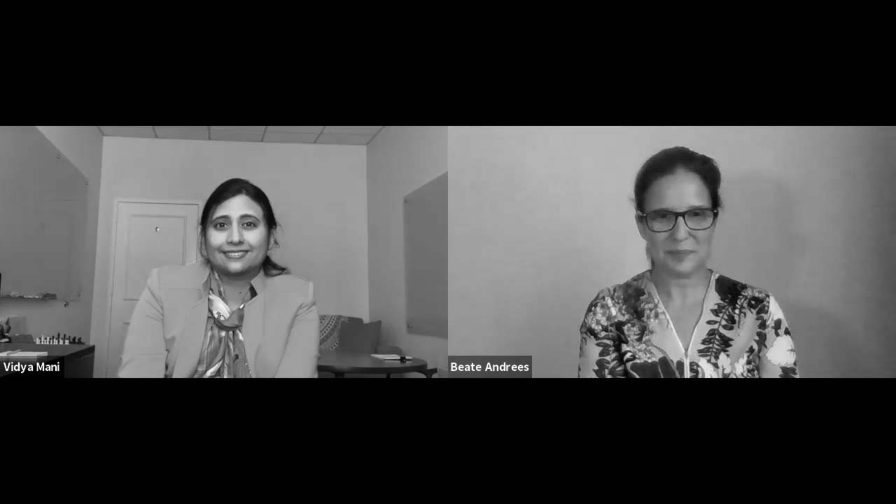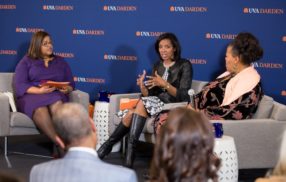
Leadership Unscripted: Addressing the Future of Work, and Workers Rights, During a Continuing Pandemic
By Jen A. Miller
The International Labor Organization, a United Nations Agency that works to advance social and economic justice, had just celebrated its 100th anniversary when the COVID-19 crisis hit. Items they had addressed in their Centenary Declaration of Work — things like increasing investment in sustainable work and ensuring worker protection — were suddenly promoted from being just important to critical.
Beate Andrees, special representative to the U.N. and director of the ILO (which is now part of the U.N.), spoke with University of Virginia Darden School of Business Professor Vidya Mani at a Leadership Unscripted event about the role the organization plays in a world where every day feels like an emergency.
At the time of the 25 August discussion, not only was the world still reeling from the rapid spread of the Delta variant of COVID-19, but also efforts to evacuate vulnerable people from Afghanistan were underway.
For security reasons, Andrees could not discuss the ILO’s efforts there, but she said her colleagues at the ILO and at the U.N. recognize that we are living in a “profound” time of a protracted crisis and emerging crises “for which we have to prepare.”
“Our hands are full,” she said, speaking one day before a deadly explosion at the airport in Kabul.
Most of her day is spent responding to daily crises, “but we are also working on the long term visioning and planning for the future,” she said, focusing specifically on areas of inequality in the socioeconomic realm.
As part of the ILO’s centennial, Andrees delved into the ILO archives and read “the original documents when the ILO was set up after the first World War,” she said.
“It’s interesting to see how some of the problems of 100 years ago are still issues today,” she added. “The solutions might be different, but the toolbox is pretty much the same.”
The organization used those archives, and discussions and negotiations with the group’s constituents, to draw the ILO Centenary Declaration of the Future of Work, which takes a human-centered approach to increasing investment in people’s capabilities, increasing investment in institutions of work, and increasing investment in decent and sustainable work.
The declaration also calls on members states to ensure all people benefit from the changing world of work, ensure the continued relevance of the employment relationship, ensure adequate protection for all workers, and to promote sustained, inclusive and sustainable economic growth.
“Then COVID hit and really turned everything upside down, but also confirmed many of the urgent priorities we set out,” Andrees said.
She also addressed the current global labor situation. While many U.S. businesses are struggling to hire enough workers, worldwide, more than 250 million jobs were lost due to the COVID crisis according to an ILO report.
“Some of these jobs will never come back,” she said. We’ve got to prepare for that.”
This can be done in part by focusing on so-called “care” and “green” economies, which requires public investment.
“Industrialized countries have adopted these measures in recent months in response to COVID, which is commendable,” she said, but it’s not enough on a global scale, adding that in emerging economies and countries, “the fiscal stimulus gap is in the trillions.”
As part of its COVID response, the ILO has actively engaged with the U.N. in the “Financing for the Development in the Era of COVID-19 and Beyond Initiative” to work to address this gap.
Major economies responding to the COVID crisis was a good thing, she said, but if the investment is not matched in developing companies “we fear there will be a widening gap globally,” she said, which, among many problems, could have an impact on global supply chains and global trade.
Mani, whose research focuses on creating secure and sustainable supply chains, asked Andrees about the importance of socially responsible supply chains, and ensuring that they do not use child or forced labor.
“At business schools around the world, we teach supply chain management. It’s a core part of the curriculum, and we value things like flexibility and responsiveness and adaptation,” Mani said, noting that a focus on socially responsible business practices isn’t just the right thing to do, but good for the global supply chain. She stressed that we need to invest in our supply chains early on.
Mani added that the pandemic also shined a spotlight on how important it is to see the human impact of any business crisis. She cited seafarers who have been stranded for months, even more than a year, on their boats because “no port was willing to take them,” she said. “We think of it as a capacity problem, but there’s also a humanitarian crisis.”
As consumers, we might think of supply chain interruptions as not being able to get the exact new car we want, or a business not being able to meet production capacity “but we also need to look at the worker side of the story,” Andrees said.
Giving workers a voice through things like freedom of association and collective bargaining can curb bad labor practices, from ending child labor to addressing gender wage gaps, Andrees added. She cited the fishing sector in Thailand, which had “massive problems with labor rights, on shore and off shore, including forced labor,” she said. “When we started looking at this problem, there were no independent trade unions representing workers in the fish industry.”
While the labor situation isn’t perfect, the ILO has been helping fishing sector employees make progress, steps that have helped curb forced labor practices and ensure health and safety requirements.
Andrees concluded her talk by having attendees ask themselves: “What is important for us? Where do we put our money?”
That might mean thinking about how much we pay someone to clean our homes or watch our children; or how much money a developing nation or a private business invests in an emerging one to create jobs in the green economy.
“You’ve got to ask this question of all of us,” she said.
The University of Virginia Darden School of Business prepares responsible global leaders through unparalleled transformational learning experiences. Darden’s graduate degree programs (MBA, MSBA and Ph.D.) and Executive Education & Lifelong Learning programs offered by the Darden School Foundation set the stage for a lifetime of career advancement and impact. Darden’s top-ranked faculty, renowned for teaching excellence, inspires and shapes modern business leadership worldwide through research, thought leadership and business publishing. Darden has Grounds in Charlottesville, Virginia, and the Washington, D.C., area and a global community that includes 18,000 alumni in 90 countries. Darden was established in 1955 at the University of Virginia, a top public university founded by Thomas Jefferson in 1819 in Charlottesville, Virginia.
Press Contact
Molly Mitchell
Associate Director of Content Marketing and Social Media
Darden School of Business
University of Virginia
MitchellM@darden.virginia.edu







